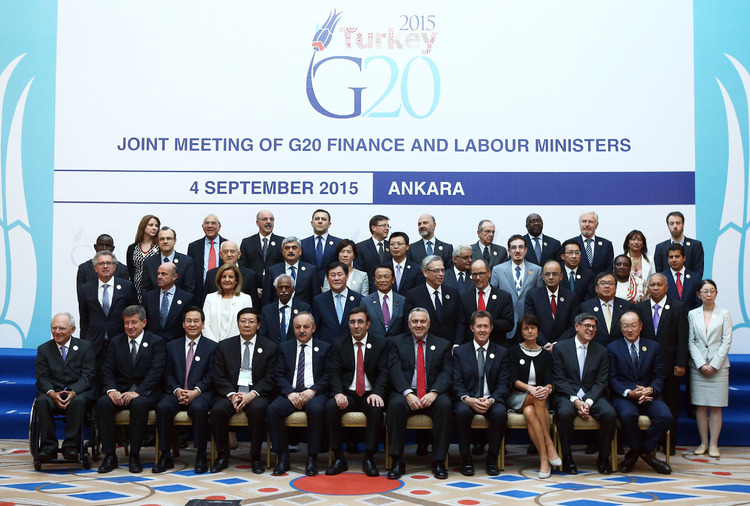
Finance ministers and central bank chiefs from the world’s top 20 economies at the G20 meeting in Ankara on Sept. 4. Photographer: Adem Altan/AFP/Getty Images
Tension as Zhou Says Bubble Has Burst
by Greg QuinnJames Mayger Sharon Chen
Global finance chiefs sought to contain tensions over currency movements with China suggesting its August devaluation won’t be repeated any time soon and Japan labeling the Chinese unhelpful.
Zhou Xiaochuan, governor of China’s central bank, told a meeting of Group of 20 finance ministers in Ankara that a stock-market bubble in his country had “burst,” according to Japan’s Taro Aso. Another official present at the talks said China had presented the country’s situation as a new normal.
“It wasn’t enough,” Aso told reporters. “They may have tried to be constructive, but they weren’t detailed enough.”
China is on the defensive as its slowing economy and market turbulence send shock waves through emerging markets just as the U.S. is preparing to raise interest rates. With the MSCI emerging market index down 18 percent so far this year, a draft communique prepared before the meeting cited “recent volatility in financial markets” and the need to monitor potential spillovers.
The Shanghai Composite index has lost about 40 percent since reaching a three-year high in June. Zhou used the word “burst” three times in his explanation of what is going on with the stock market, according to a Japanese finance ministry official.
The Chinese delegation said they were trying to shift to a different growth model with as little disruption as possible, according to an international official participating in the talks. They said were trying to reduce indebtedness and are planning measures that will regulate swings in the stock market.
“China is definitely trying to play a constructive role,” Canadian Finance Minister Joe Oliver said in an interview. “It is the second-largest economy in the world and so when it slows down it has global implications. That is I think what we are dealing with.”
Stability Forecast
China’s surprise decision to revalue the yuan as it tried to contain the stock market turmoil caused the currency to drop the most in 21 years last month, triggering exchange-rate declines elsewhere in the emerging world on concern a weaker yuan will hurt countries exporting to China.
The Chinese delegation said the currency move wasn’t an attempt to grab exports from their international competitors and that explanation was accepted by the other nations, according to the international official.
The Chinese asked for specific references to their problems to be left out of the final communique, a euro-area aide said.
“No one can predict exactly on the market volatility, but I’m confident that the renminbi exchange rate will be more or less stable around the equilibrium level,” Yi Gang, China’s deputy central bank governor, said in an interview as he headed into Friday’s session. “The Chinese economy’s fundamentals are fine.”
U.S. Treasury Secretary Jacob J. Lew told Chinese Finance Minister Lou Jiwei in Ankara on Friday that it’s important for China to signal that it will allow market pressures to drive the yuan up as well as down. China should avoid persistent exchange-rate misalignments and refrain from competitive devaluation, Lew said, according to a Treasury statement.
Fed Hikes
China’s slowdown comes as the Federal Reserve is considering raising U.S. interest rates for the first time in nine years.
Vice Chairman Stanley Fischer explained the Fed’s very gradual, cautious approach to tightening monetary policy in a presentation to delegates, according to an official with knowledge of the discussions. Fischer
The draft statement seen by Bloomberg News before the talks began said that in line with the improving outlook, “monetary policy tightening is more likely in some advanced economies, which may remain one of the main sources of uncertainty in financial markets.”
Some delegates from emerging markets said at the meeting that the Fed should get on with raising rates to end uncertainty, according to an official who was present.